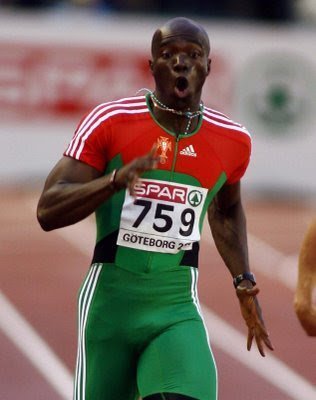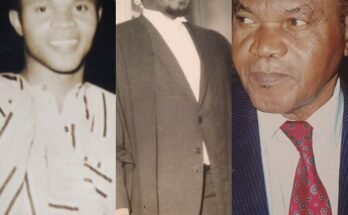Nathan Obijiofor switched from track and field to soccer at OGSS and grabbed the gloves as he commanded the school team from the rear. It was short lived after a 3-1 loss to Emmanuel College, Owerri.
Francis Obiora Obikwelu played soccer, like his father. On a certain day, his coach sized his potentials and asked him to try athletics. The boy dropped his cleats and picked a pair of spikes.
Obijiofor, from Nanka, and Onitsha-born Obikwelu are arguably the greatest athletes produced by Government Secondary School, Owerri.
Obijay, as we fondly called him in the mid-1970s, made history when he won the 400 metres Hurdles race at the 1979 All Nigeria Senior Athletics Championships in Lagos.
It was a spectacular event because that same year, women took part in the hurdles for the first time. While Obijiofor dusted the men to gold, Joan Elumelu became the first Nigerian female 400 metres Hurdles champion.
Elumelu is better known as a beauty queen who later went into fashion as Joan Okorodudu. She was first runner-up at the 1981 Miss Nigeria pageant. The winner, Mrs Tokunbo Onanuga, was lucky to keep the crown after allegations of certificate forgery.
By winning in 1979, Obijiofor replaced 1978 champion, M. Fyneface. Taiwo Ogunjobi, gold medalist in 1977, died 15 years later as a major in the Nigeria Army.
He was one of those who lost their lives in the Nigerian Air Force C-130 crash at Isheri Osun, Lagos. His younger brother, Taiwo Ogunjobi, played for Shooting Stars of Ibadan and was team manager in 1992 when the Oluyole Warriors won the first CAF Cup.
If Obijiofor was national champion, Obikwelu went further. He became a world champion at 18 in 1996. It was at the 1996 IAAF World Junior Athletics Championships in Sydney, Australia.
Obikwelu was not just a global champion, he was a double champion after winning the 100 metres and 200 metres events. No athlete had achieved that feat before.
It was a spectacle. IAAF Media and Public Relations Director, Giorgio Reineri, found a befitting headline. ” Obikwelu is faster than the wind”, he wrote.
He thus became the third Nigerian to win the World Juniors 100 metres race. Davidson Ezinwa did it in 1990. Deji Aliu followed in 1994.
To achieve stardom, Obikwelu had to abandon Nigeria after the 1994 World Juniors in Lisbon, Portugal. He disappeared from camp after the championships with the trio of Wilson Ogbeide, Sylvester Omodiale and Kunle Adejuyigbe.
Life became pretty tough as he turned to menial jobs after being rejected by Sporting Club, Lisbon. In a twist of fate, coach Fausto Ribeiro came looking for the Nigerian.

Obikwelu was doing the 400 metres for Nigeria before the escape. He won silver at the Algiers ’94 African Juniors.
The OGSSIAN boy was on the rise and did not turn back on his country of birth. As a senior, he was in the silver winning 4×100 metres relay team that included Innocent Asonze, Daniel Effiong and Aliu at the Athens ’97 World Championships.
Two years later at Sevilla ’99, Obikwelu won an individual bronze in the 200 metres.
The Sydney 2000 Olympic Games was supposed to be another gold medal opportunity. Unfortunately, the sprinter arrived with injury. I was in Sydney and expected much.
Obikwelu managed his injury by pulling out of the 100 metres to concentrate on the 200 metres as advised by Aliu. In the Second Round, he finished third in Heat Four which was enough to take him to the semi-finals.
That was where it ended. Obikwelu was seventh in Heat one. The hero of the Nigerian team was Enofiok Udobong, the dark horse who anchored the 4×400 relay team to silver which later turned gold after winners, United States lost to drugs.
Nigeria abandoned Obikwelu with injury. The star had to take care of himself in Canada. That led to a change of nationality to Portugal. And he waited until 2001 to do it.

Again he chose Australia to announce the decision. After the IAAF Grand Prix final in Melbourne, Obikwelu dumped Nigeria.
Running for Portugal, the white and sky blue boy became European champion. He was 100 metres king at Munich 2002 after Dwain Chambers of Great Britain was stripped of his drug tainted gold.
Obikwelu won silver for his adopted country in the 100 metres at the Athens 2004 Olympics. Nigeria was lucky to win bronze in the relay. Earlier in 2002, he won the 200 metres gold for Europe at the IAAF World Cup, Madrid 2002.

African champion, [Obikwelu won gold at the South Africa ’99 All Africa Games] European champion and world champion. That is what we all should be proud of.
We were not good footballers. I think the best came from Emma ‘Terror’ Ajunwa who won gold with Imo State Trojans at the Oluyole’79 Fourth National Sports Festival.
Chukwuma ‘Newman’ Onyeaghala had died while Enugu Rangers fought to win a contintal trophy in 1975. He left in a crash around Ijebu Ode, with five supporters including Rainbow.John Azinge, Chike Ikebuaku and John Uwanaka survived with injuries.
However, the present generation took to soccer. Our school won the Shell Cup for Nigerian secondary schools in the last decade. The team also retained the trophy.
Good cricketers, we had them. From Okwudiba Nnoli to Ekeocha ‘Flint’ Nnadozie and Olisa Egwuatu. You cannot talk of Howzat in Nigeria today without mentioning Egwuatu. He has moved into coaching and administration.

Emeka Obasi is a Graduate of History, University of Benin. He Worked as Diplomatic Correspondent and Sports Editor, respectively for Champion Newspapers. He also worked as Executive Director and Editor, Sportstar Newspaper. He was Media Adviser to former Abia State governor, Orji Kalu. Managing Editor, New Telegraph Newspapers. Presently, Consultant Historian and Communications Strategist.
![]()






